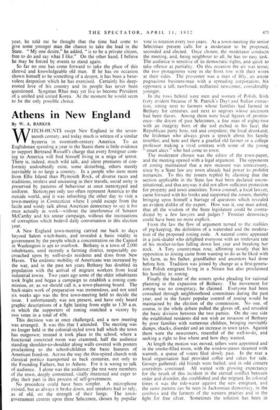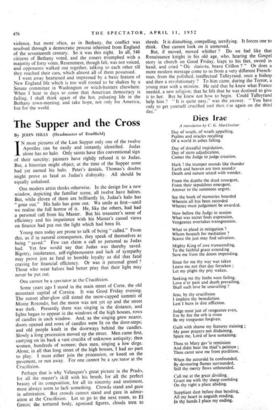Athens in New England By W. A. BARKER W ITCH-HUNTS swept
New England in the seven- teenth century, and today much is written of a similar hysteria in twentieth-century America. To an Englishman spending a year in the States there is little evidence to support Bertrand Russell's charge that every foreigner com- ing to America will find himself living in a reign of terror. There is, indeed, much wild talk, and silent pressures of con- formity undoubtedly exist, some disturbing, others merely inevitable in so large a country. In a people who stem more from Ellis Island than Plymouth Rock, of diverse races and traditions, restless and unceasing in their travels, social unity is preserved by patterns of behaviour at once stereotyped and uniform. Stereotypes only too often represent America to the outside world, and it was refreshing the other day to visit a town-meeting in Connecticut where I could escape from the facile and windy talk about American democracy to see it for once actually at work—without the interference of Senator McCarthy and his smear campaign, without the insinuations of corruption which bedevil daily conversation in this election year.
A New England town-meeting carried me back to days beyond Salem witch-hunts, and revealed a basic vitality in government by the people which a concentration on the Capitol in Washington is apt to overlook. Bethany is a town of 2,000 inhabitants, until recently a farming district, respectably en- croached upon by well-to-do residents and dons from New Haven. The endemic mobility of Americans was-increased by the war, and in the past ten years Bethany has doubled its population with the arrival of migrant workers from local industrial towns. Two years ago some of the older inhabitants took fright and began a campaign to establish a zoning com- mission, or, as we should call it, a town-planning board. The back-stairs work of preparation was tremendous, and not until six weeks ago was the first town-meeting held to decide the issue. I unfortunately was not present, and have only heard graphic descriptions of a fight lasting from eight to 1.30 a.m. in which the supporters of zoning snatched a victory by two votes in a total of 456.
This decision was at once challenged, and a new meeting was arranged. It was this that I attended. The meeting was no longer held in the colonial-styled town hall which the town has outgrown; instead it took place in the school, where a functional concreted room was crammed, half the audience standing shoulder-to-shoulder along walls covered with posters proclaiming to the school-children the basic features of American freedom. Across the way the thin-spired church with classical portico transported us back centuries, not only to the Founding Fathers, but to Athens. For it is wrong to talk of audience. I alone was the audience; he rest were members of the town, deeply committed, vitally interested and eager to play their part in this process of self-government. No procedure could have been simpler. A microphone existed, but as always it broke down, and speakers had to rely, as of old, on the strength of their lungs. The town- government centres upon three Selectmen, chosen by popular vote in rotation every two years. At a town-meeting the senior Selectman present calls for a moderator to be proposed, seconded and elected. Once chosen, the moderator conducts the meeting, and, being neighbour to all, he has no easy task. The audience is sensitive of its democratic rights, and quick to take offence at partiality. On this occasion the air was tense; the two protagonists were in the front row with their wives at their sides. The pro-zoner was a man of fifty, an astute pugnacious business-man with a spreading corporation; his opponent a tall, rawboned, redhaired newcomer, considerably younger.
In the rows behind were men and women of Polish, Irish (very evident because of St. Patrick's Day) and Italian extrac- tion, sitting next to farmers whose families had farmed in Bethany for centuries, and next to negroes whose ancestors had been slaves. Among them were local figures of promin- ence—the doyen of past Selectmen, a fine man of eighty-two with an integrity born of the soil etched in his face; the Republican party boss, red and corpulent; the local drunkard; the Irishman who always giVes a speech about his family troubles; and here and there a gnarled old farmer or a college professor making a vivid contrast with some of the young "smart alecs " who had come to town.
The moderator chosen was the editor of the town-paper, and the meeting opened with a legal argument. The opponents of zoning maintained that a new measure was unnecessary, since by a State law any town already had power to prohibit nuisances. To this the zoners replied by claiming that the section applicable in the State law had been declared uncon- stitutional, and that anyway it did not allow sufficient protection for property and town amenities. Town counsel, a local lawyer, came forward with his books and supported the zoners, thereby bringing upon himself a barrage of questions which revealed an evident dislike of the expert. How was it, one man asked, that all the wisdom of the State legislature could be contra- dicted by a few lawyers and judges ? Frontier democracy could have been no more explicit.
From the law the flow of argument turned to the realities of pig-keeping, the definition of a watershed and the modera- tion of the proposed zoning code. A natural comic appeared in a junk-dealer who delighted everyone with an irrelevant tale of his mother-in-law falling down last year and breaking her neck. A Tory countryman rose, affirming stoutly that his opposition to zoning came from wanting to do as he liked with his farm, as his father, grandfather and ancestors had done before him. Tradition was joined by change as a first-genera- tion Polish emigrant living in a Nissen hut also proclaimed his hostility to zoning.
Finally the leader of the zoners spoke pleading for rational planning in the expansion of Bethany. The movement for zoning was no conspiracy, he claimed. Everyone had been consulted through neighbourhood committees during the past year, and in the future popular control of zoning would be maintained by the election of the commission. No one, of course, in the whole debate pulled the gloves off, and revealed the basic division between the two parties. On the one side the established residents did not wish an invasion of Bethany by poor families with numerous children, bringing inevitably dumps, shacks, disorder and an increase in town taxes. Against them were the newcomers, resentful of the well-to-do, and seeking a right to live where and how they wanted.
At length the motion was moved, tellers were appointed and in the smoke-filled room, with the window-panes steamed with warmth, a queue of voters filed slowly past. In the rear a local organisation had provided coffee and cakes for sale. Groups gathered; old friends were hailed; and in odd corners courtships continued. All waited with growing expectancy for the result of this incident in the eternal conflict between order and disorder, the established and the migrant. In colonial times it was the tide-water against the new emigrant, and the same pattern can be seen in Jacksonian democracy, in the cowboys and the farmers of the western prairies and in the fight for free silver. Sometimes the solution has been in violence, but more often, as in Bethany, the conflict was resolved through a democratic process inherited from England of the seventeenth century. So it was this night. In all, 548 citizens of Bethany voted, and the zoners triumphed with a majority of forty votes. Resentment, though felt, was not voiced, and opponents walked out together, talking to each other till they reached their cars, which almost all of them possessed. I went away heartened and impressed by a basic feature of New England life which is too well rooted to be shaken by a Senate committee in Washington or witch-hunters elsewhere. When I hear in days to come that American democracy is failing, I shall think again of the hot, pulsating life in the Bethany town-meeting, and take hope, not only for America, but for the world.



































 Previous page
Previous page